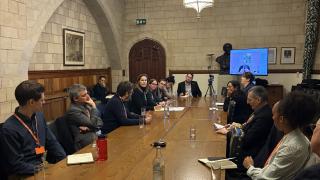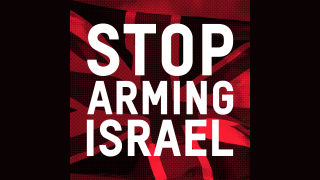
This article was originally published by the UK Campaign to Stop Killer Robots. UNA-UK hosts the co-ordinator of the UK Campaign to Stop Killer Robots, and is also a member of the global campaign.
The call for a comprehensive international treaty on Autonomous Weapon Systems (AWS) has become more urgent than ever. As technological advancements in AI continue to develop at an accelerating pace, the risk of unregulated and potentially dangerous military applications has become too urgent to ignore. This was the key message at a recent parliamentary roundtable, where experts gathered to discuss the growing need for the UK to support the creation of a new United Nations treaty on AWS.
The roundtable held on 4th February 2025 was jointly hosted by the Human Rights APPG, the UK Stop Killer Robots Campaign and UNA-UK. It was chaired by Melanie Ward MP and brought together a distinguished panel including Ambassador Alexander Kmentt, Director of the Disarmament, Arms Control and Non-Proliferation Department of the Austrian Foreign Ministry, Dr Alexi Drew from the International Committee of the Red Cross (ICRC), and Elizabeth Minor from Article 36.
The Need for a New Treaty
The current international legal framework, particularly International Humanitarian Law (IHL), is not equipped to adequately address the challenges posed by AWS. Dr Alexi Drew outlined that while there is no gap in the law itself, there is a significant gap in its interpretation, which has led to permissive uses of AWS. The key concern is that existing IHL fails to provide clarity on how these systems should be regulated, especially in unpredictable and complex conflict environments.
Panellists agreed that a new legal instrument is necessary to fill this gap. The proposed treaty would focus on controls on AWS that can make autonomous decisions in targeting human beings. As warfare becomes increasingly complex, it becomes increasingly important to ensure that decisions about human life are not made without meaningful human oversight. Algorithmic bias and nuances of human behaviour mean limitations on the duration, scope, and nature of AWS should be covered by a UN treaty. This doubly true when these systems are used in areas where civilians are likely to be present.
The UK’s Role in the Global Effort
The UK’s current stance on AWS regulation has raised questions. Despite being a leader in arms control efforts in the past, including support for treaties on landmines and cluster munitions, the UK has been reluctant to commit to negotiations on AWS. This hesitation is seen as a missed opportunity for the UK to take a leadership role on a critical issue of global security and human rights.
Elizabeth Minor highlighted the growing global consensus on the need for a treaty, with over 120 states supporting the negotiation of such an agreement. The UK was urged to align itself with this growing coalition, given its past success in championing international humanitarian law and its role on the security council. The treaty on AWS would not provide an outright ban on the use of these types of weapons systems but create a framework where they can be developed under agreed the norms of international law. There are early signs that the UK’s position is shifting with recent comments by the Prime Minster at the UN General Assembly that this challenge is now too urgent to ignore.
The ongoing conflict in Ukraine has already witnessed the use of AWS, underscoring the urgency of addressing the proliferation of these systems before they become even more accessible to both state and non-state actors. As Dr Drew noted, “the window for preventative action is closing rapidly.” The need for action is especially pressing as AWS technology is becoming more advanced and widely deployed.
The Political Challenges
One of the key barriers to progress is the obstructionist behaviour from countries like Russia, which has repeatedly blocked the movement from discussions to negotiations at the UN. Ambassador Alexander Kmentt, one of the architects of the Treaty on the Prohibition of Nuclear Weapons emphasized that while some states, particularly in the West, are hesitant to proceed without China and Russia’s support, waiting for full consensus could be detrimental. The proliferation of AWS is a global issue that requires immediate action, and delays will only make regulation more difficult in the future.
While Russia’s stance remains firm, panellists suggested that there are alternative avenues for advancing the treaty, such as convening non-UN discussions or seeking a lead sponsor from individual states, which is similar to the approach used in the negotiation of the TPNR.
Ambassador Kmentt stressed that proliferation of these types of weapons was a very real threat and we are nearing the point where these systems could be deployed by non-state actors such as terrorist groups. As such a treaty is urgently needed, not only to guide the development of AWS by states but also prevent proliferation.
The UK has an opportunity to help guide the development of a treaty on AWS and can be leading on addressing the challenges posed by AWS and AI in conflict zones. By supporting the negotiation of a UN treaty, the UK can help ensure that future warfare remains governed by clear legal framework which prioritize human rights and humanitarian concerns without damaging UK defence assets. The UK position is very close to that outlined by the ICRC and other panellists. All that remains is for the UK to recognise this treaty as an opportunity to re-engaged with global community and champion human rights and the rule of laws again in our international relations.






